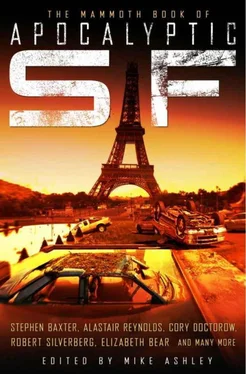The machines went to the burial place and drew out a core of ice. Anya’s body was wrapped in an embroidered sheet and placed feet first in the bore hole. Finally, as they had been taught, the machines reverently capped her grave with powdered ice and played the music appropriate to the death of a lady of the palace. The sound was heard only by the wolves and bears of the wilderness. Her grave, the last in row upon row of similar graves, lay under the bleak gaze of the comet.
The comet hurtled on, over wrinkled mountains, arid plains, sundrenched ocean. Wild dogs howled at its passing; owls blinked under its bright gaze.
Kuri squatted beside a thorn tree, his shadow black and dwarfish under the equatorial sun. He reached out a dark, bony hand and picked up a fragment of yellow ringlass from the jigsaw of coloured shards at his feet, laying it carefully to one side with pieces he had already chosen. After a few moments’ thought, chin in cupped hand, he selected a second piece, green this time and laid it with the others. He removed his wide-brimmed hat and half-filled it with the selected glass then, rising stiffly, walked towards his house beside the lake. His body was wiry and naked, his knobbly feet bare; without his hat, only a tangle of grey and black hair protected his head from the sun.
His way to the domed building lay across a hundred metres of flat desert, fringed at its margin by dark reeds. From there the jade-green lake stretched into the west. A feather of white vapour spiralled from the volcano on Crocodile Island and dispersed in the shimmering air. Kuri stopped halfway to catch his breath, his throat rasped by the harsh taint of the volcano. He gazed with narrowed eyes, half-blinded by the beauty of his ancient home, placed like a jewel of many colours between him and the lake. At this time of day the windows were almost inaudible, a subdued harmony, but to the sight they blazed with the brilliance of the noonday sun.
There was a flicker of movement near the water. Kuri shaded his eyes with his free hand then grinned and whistled loudly through his fingers. The moving shape bounded towards him on all fours but rose onto hind legs when it reached his side. The creature, yellow-brown like the earth, planted a slender fore paw on each side of his chest. Green eyes, adoring as a dog’s, gazed up at him from a flat, cat-like face. Her tongue rasped his skin.
He bent and kissed her between the ears, then said, “Drink, Jade.”
“Drink? Water? Juice drink?” she answered in her breathy growl. She rubbed her head against his hand and he stroked her under the chin.
“Juice. In the house,” he said. She raced back towards the glowing building, her tail waving like a yellow plume. Kuri followed more slowly still clutching his hat. The glass vibrated gently, picking up the resonance of the house. His feet left one more line of prints in the dusty earth. He looked back; today’s line went only to the thorn tree and the previous day’s reached no further, yet he was very tired. He squinted to see older tracks. There were Jade’s paw marks skittering here, there and everywhere and the bigger marks of her cousins, the wild adapts. He saw the slots of jumpbuck and, with a stir of anxiety, the recent pug marks of a fanged leopard. Plodding into the distance and only faintly discernible were the wide prints of his own dromedary. Was it then so long since he had ridden it inland? He realized with some surprise that it was two months at least. He turned slowly, looking in vain for signs of his own tracks extending further than the thorn tree and the pile of ringlass sparkling in the sun. He looked at his hand, black and wrinkled; at his arm thin and sere as a dead thorn-branch. A shade fell across his soul.
Kuri shrugged and trudged on. He was thirsty and there was work to do on the east window. The dark entrance to his home was cool and inviting below the blazing windows. He ducked to avoid the curved roof of the tunnel and plunged below ground like a fox to earth. Breathing heavily again, he sat down in the cool light of the northern window that glowed high above him. Jade skipped up to him on her hind legs, holding a beaker between her front paws. He drank, and his skin rained cold drops of sweat. He turned to Jade but she had anticipated his next wish, and was proffering a square of damp lake-weed. He smiled at the little creature; in the window light her tawny coat was dappled purple and bronze like a child’s toy. She pirouetted on two legs as if she knew he found her antics comical.
“Good Jade,” he said, wiping his forehead. “You must go out this evening. Play with your friends.”
“Kuri play with Jade?” she said.
“I’m too old to play. Old creatures don’t play.” She dropped to all fours and rubbed against his knee. Using her mouth she took the weed from his hand, growling playfully, shaking her head about; then seeing he wasn’t going to join the game, trotted out of the house to return it to the water.
Kuri sighed and stretched his creaking bones. He wanted to sleep but wanted even more to return to his task. He lurched to his feet and fetched another juice drink from the cold store. He went over to the east side of his dwelling and, with a critical eye, gazed up at the sun-shaped east window, brilliant in orange and yellow and yet transmitting no heat to him. He could not remember who had installed the window — his mother? Perhaps even his grandfather. He frowned trying to recall that distant time when three people had lived here — no four: there had been his brother, Omu, who had died from a snakebite.
He bent stiffly and picked up his krar, twanging its three strings in turn. A high keening resonated from the window above him. He shook his head in distaste then played a series of chords. The keening descended in pitch but was still unpleasing to his ear. This must have been the original artist’s idea of the rising sun — too harsh, too strident for him.
He emptied his hat of the glass pieces and piled them onto a basketful he had selected on previous days. Then he ambled round the chamber picking up tools here and there, taking them and the glass over to the east side. Finally he uttered a word of command and a wooden platform emerged creakily from the wall and swung towards him, lowering itself to floor level. He piled everything on to it and clambered up, directing the platform until it had risen on a swivelling arm to the roof. Even so close to the blazing sun of the window he was neither dazzled nor overheated, such was the wonder of ringlass.
Once Kuri had decided the effect he wanted he worked quickly, tapping out crescents of citrine and gamboge from the solar orb. As he removed the pieces the true heat of the day blasted through the lattice like a wind from the volcano.
He mopped his forehead with the brim of his hat then jammed it on his head. The lattice itself writhed in discomfort and gratefully hugged the replacement sections, softer shades of rose and ochre, that he offered it. As each new piece was inserted he tuned it with his krar, slicing tiny slivers of glass from the sections he was altering until both sight and sound merged with the image in his head.
By the time he lowered the mechanism to the ground the sun was sinking towards the western window which already vibrated gently in anticipation. Kuri slumped to the floor, too exhausted even to fetch himself another drink. He looked around for Jade but she was not sleeping in her usual place, under the cool light of the northwest spiral, the only silent window. In his mind’s eye he saw her, among the reeds, skipping and pouncing with her adapt cousins. That would be only right.
He licked dry lips. She must prepare for a future without him — quite soon, he thought. But then he heard her familiar call, the repeated little noise she made when she was bringing him food. She bounded in through the entrance tunnel, a wriggling fish held in her jaws. She dropped it at his feet and ran outside again, mewing joyfully. Kuri smiled, shaking his head. “I’m not hungry,” he whispered to himself.
Читать дальше












